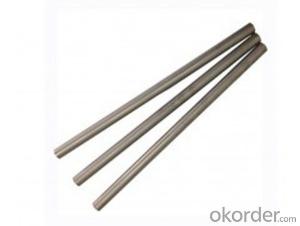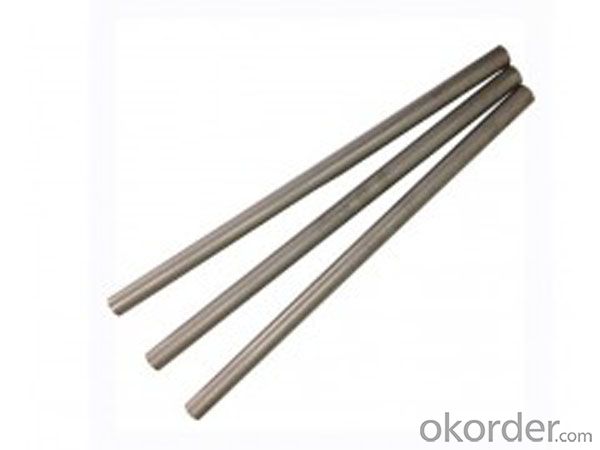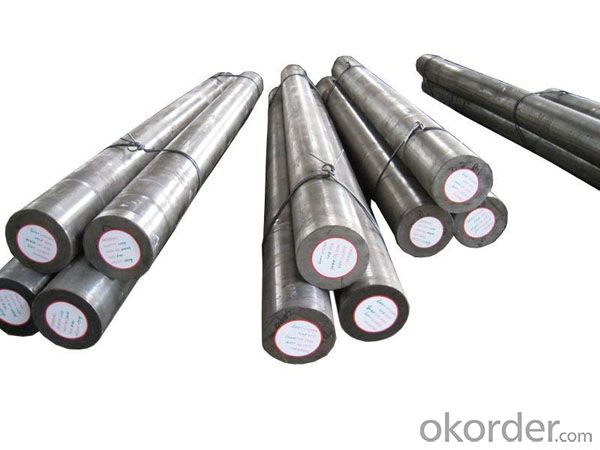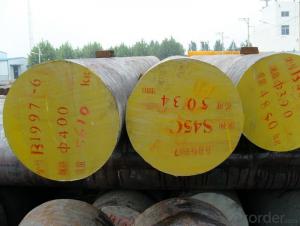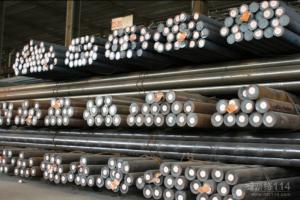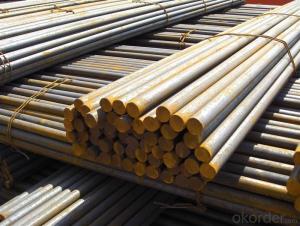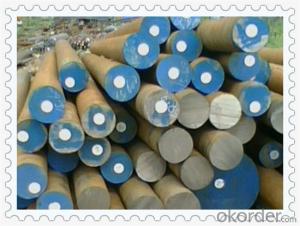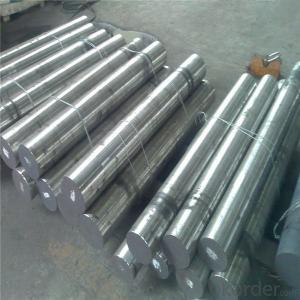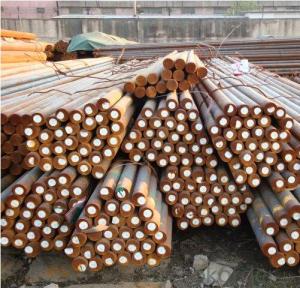Alloy Steel SUJ2 Bearing Round Steel Special Steel
- Loading Port:
- China main port
- Payment Terms:
- TT OR LC
- Min Order Qty:
- 25 m.t.
- Supply Capability:
- 10000 m.t./month
OKorder Service Pledge
OKorder Financial Service
You Might Also Like
Specification
Chemical Composition(GB)%
| C | Si | Mn | Cr | Cu | S |
| 0.95-1.05 | 0.15-0.35 | 0.25-0.45 | 1.4-1.65 | ≤0.20 | ≤0.020 |
Heat Treatment
| Item | Temperature ℃ | Hardness |
| Anneal | 790-810 | 170-207HB |
| Quenching | 830-860 | 62-66HRC |
| Tempering | 150-180 | 61-66HRC |
Characterstics
| 1.Uniform hardness,Good abrasion resistance |
| 2.High contact fatigue resistance |
| 3.Cutting performance in general |
Applications: Used to make the load of the larger small cross-section conditioning and stress smaller large parts


1, Your advantages?
professional products inquiry, products knowledge train (for agents), smooth goods delivery, excellent customer solution proposale
2, Test & Certificate?
SGS test is available, customer inspection before shipping is welcome, third party inspection is no problem
3, Payment Terms?
30% TT as deposit and 70% before delivery.
Irrevocable L/C at sight.
4, Trading Terms?
EXW, FOB, CIF, FFR, CNF
6, After-sale Service?
We provides the services and support you need for every step of our cooperation. We're the business partner you can trust.
For any problem, please kindly contact us at any your convenient time.
We'll reply you in our first priority within 24 hours.
- Q: What are the requirements for special steel used in robotic applications?
- Special steel used in robotic applications must possess certain key requirements to ensure optimal performance and reliability. These requirements include: 1. High strength: Special steel for robotic applications needs to have excellent strength properties to withstand the stresses and loads encountered during robotic operations. It should offer superior tensile and yield strength to ensure structural integrity and prevent failure under heavy loads. 2. Wear resistance: The steel used in robotic applications should exhibit high wear resistance to withstand repetitive motions, sliding, and abrasive contact with different surfaces. This helps to minimize wear and tear, extending the lifespan of the robotic components. 3. Corrosion resistance: Robotic applications can often involve exposure to various environments, including moisture, chemicals, and other corrosive agents. Therefore, the special steel utilized should possess excellent corrosion resistance to prevent degradation and maintain performance over time. 4. Toughness: Special steel should have good toughness, enabling it to absorb energy and resist fracture or cracking. This is crucial to ensure that the steel can withstand sudden shocks or impacts without catastrophic failure, enhancing the safety and reliability of the robotic system. 5. Machinability: Robotic components often require complex shapes and precise dimensions. Therefore, the special steel used should have good machinability, allowing for easy cutting, shaping, and forming without excessive tool wear or difficulties in manufacturing. 6. Heat resistance: Robotic applications sometimes involve exposure to high temperatures, such as in welding or metalworking processes. It is important for the special steel to have good heat resistance to maintain its mechanical properties and structural integrity under elevated temperatures. 7. Magnetic properties: Certain robotic applications may require non-magnetic steel to prevent interference with electromagnetic sensors or systems. Therefore, special steel with low magnetic permeability is often preferred for such applications. By meeting these requirements, special steel used in robotic applications can provide the necessary strength, durability, and performance needed to facilitate efficient and reliable robotic operations in various industries, such as manufacturing, healthcare, and exploration.
- Q: How does special steel contribute to the automotive fuel efficiency?
- Special steel contributes to automotive fuel efficiency in several ways. Firstly, special steel is lighter and stronger than traditional steel, allowing for the use of thinner and lighter components in the vehicle's structure. This reduces the overall weight of the vehicle, which in turn reduces the amount of fuel needed to propel it. Additionally, special steel can be used to create more aerodynamic designs, reducing air resistance and improving the vehicle's fuel efficiency. Furthermore, special steel can be used in the manufacturing of high-efficiency engines, improving their performance and reducing fuel consumption. Overall, the use of special steel in the automotive industry helps to create lighter, more aerodynamic, and more fuel-efficient vehicles.
- Q: How does special steel contribute to the tool manufacturing industry?
- Special steel plays a crucial role in the tool manufacturing industry as it offers several advantages that enhance the quality, performance, and durability of tools. Firstly, special steel is known for its exceptional strength and toughness, which makes it ideal for manufacturing high-quality tools that can withstand heavy usage and extreme conditions. In addition to strength, special steel also offers excellent wear resistance. Tools made from special steel can retain their sharpness and cutting edge for a longer period, reducing the need for frequent re-sharpening or replacement. This not only saves time and effort but also increases productivity in various industries that heavily rely on tools, such as construction, automotive, and aerospace. Moreover, special steel can be heat-treated to achieve specific properties, such as hardness, which is vital for tools like drills, saws, and blades. This heat treatment process allows manufacturers to tailor the steel's characteristics to meet the specific requirements of different tools, ensuring optimal performance and effectiveness. Special steel also provides corrosion resistance, an essential feature for tools that may be exposed to moisture, chemicals, or harsh environments. By preventing rust and corrosion, special steel helps to prolong the lifespan of tools, reducing maintenance costs and ensuring their reliable performance over time. Furthermore, the versatility of special steel allows manufacturers to create tools with complex shapes and designs. This flexibility opens up opportunities for innovation and the development of specialized tools that cater to unique applications and industries. Special steel can be easily machined, welded, and formed into various tool designs, enabling manufacturers to create efficient and ergonomic tools that offer improved handling and user comfort. In summary, special steel significantly contributes to the tool manufacturing industry by providing strength, wear resistance, heat treatability, corrosion resistance, and versatility. These properties enable the production of high-quality tools that are durable, reliable, and efficient, meeting the demands of diverse industries and enhancing productivity.
- Q: How does special steel perform in high-temperature applications?
- Special steel performs exceptionally well in high-temperature applications. It has excellent heat resistance and can withstand extreme heat without losing its strength or shape. This makes it highly suitable for use in industries such as aerospace, power generation, and automotive, where it is exposed to high temperatures and thermal stress. Additionally, special steel exhibits good oxidation and corrosion resistance, ensuring its durability and reliability in these demanding conditions.
- Q: What are the properties of nitriding steel?
- Nitriding steel is a specialized process used to enhance the surface hardness and wear resistance of steel. The properties of nitriding steel include improved surface hardness, increased resistance to wear, improved fatigue strength, enhanced corrosion resistance, and reduced coefficient of friction. This process forms a hard nitride layer on the surface of the steel, making it suitable for applications in industries such as automotive, aerospace, and manufacturing, where durability and performance are crucial.
- Q: Can special steel be used in the paper manufacturing industry?
- Yes, special steel can be used in the paper manufacturing industry. Special steels, such as stainless steel, can be used to make various components and equipment used in the paper manufacturing process. These steels offer excellent corrosion resistance, high strength, and durability, making them suitable for applications like paper machine parts, rollers, blades, and screens. Additionally, special steels can withstand high temperatures and mechanical stress, enhancing the overall efficiency and reliability of paper manufacturing operations.
- Q: How is special steel used in the aerospace sector?
- The aerospace sector heavily relies on special steel due to its distinctive properties, which make it suitable for various applications. One primary application in the aerospace industry involves using special steel to manufacture aircraft engine components. Turbine blades, shafts, and casings, which are exposed to extreme temperatures, pressures, and stresses, benefit from special steel's exceptional heat resistance, high strength, and superior mechanical properties. These qualities enable the engine parts to endure harsh conditions, ensuring optimal performance and safety. Special steel is also used in constructing aircraft structures like wings, fuselage, landing gears, and critical components. These structures must be lightweight yet strong enough to withstand flight forces. Special steel alloys, particularly stainless steel, strike a balance by providing excellent strength-to-weight ratios and corrosion resistance. Furthermore, aerospace fasteners, including bolts, nuts, and screws, rely on special steel's exceptional strength and durability to maintain the aircraft's structural integrity. Titanium alloys, known for their lightweight nature, high strength, and corrosion resistance, are frequently employed for this purpose. Additionally, special steel finds application in aerospace tooling and equipment production. Molds, dies, jigs, and fixtures used during manufacturing processes require materials that are robust, wear-resistant, and capable of withstanding high temperatures and pressures. Special steel, with its outstanding hardness, toughness, and heat resistance, proves to be ideal for these applications. In conclusion, special steel is indispensable in the aerospace sector as it provides the necessary properties for aircraft engine components, structures, fasteners, and tooling. Its unique characteristics, including high strength, heat resistance, lightweight, and corrosion resistance, contribute to the production of reliable and high-performance aerospace systems.
- Q: What are the advantages of using special steel in specific applications?
- The advantages of using special steel in specific applications include its enhanced strength, durability, and resistance to corrosion. Special steel alloys are specifically developed to meet the unique requirements of various industries, such as aerospace, automotive, and construction. These alloys offer superior performance under extreme conditions, allowing for lighter and more efficient designs. Additionally, special steel can be heat-treated to further enhance its properties, making it ideal for applications that demand high strength and toughness.
- Q: What are the main advantages of using special steel in the construction of bridges?
- The main advantages of using special steel in the construction of bridges are its high strength-to-weight ratio, excellent corrosion resistance, and durability. Special steel possesses superior mechanical properties, allowing for the construction of lighter and more efficient bridge structures. It also offers enhanced resistance to environmental factors like moisture, temperature variations, and chemical exposure, leading to longer service life and reduced maintenance costs. Additionally, special steel facilitates the use of innovative and complex bridge designs, enabling architects and engineers to create unique and aesthetically pleasing structures.
- Q: Can special steel be used in the musical instrument manufacturing industry?
- Yes, special steel can be used in the musical instrument manufacturing industry. Special steel, such as stainless steel or carbon steel, can offer durability, corrosion resistance, and unique tonal characteristics when used in the construction of musical instruments. It is commonly used for producing guitar strings, wind instrument components, and percussion instruments.
Send your message to us
Alloy Steel SUJ2 Bearing Round Steel Special Steel
- Loading Port:
- China main port
- Payment Terms:
- TT OR LC
- Min Order Qty:
- 25 m.t.
- Supply Capability:
- 10000 m.t./month
OKorder Service Pledge
OKorder Financial Service
Similar products
Hot products
Hot Searches
Related keywords
